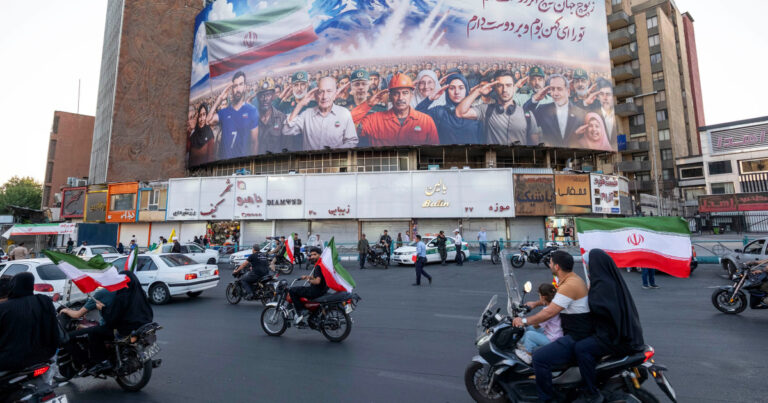U.S. bases and assets have been at their highest state of alert for months, but after Israel began warring with Iran on June 13, the officials, who spoke earlier in the week, said concerns were heightened even more about the potential for attacks on U.S. assets from Iran or its proxies in the region.
Iranian Foreign Minister Abbas Araghchi, meanwhile, warned of “everlasting consequences.”
Iran has long relied on asymmetric tactics against stronger foes, including terrorist attacks. In 1983, the U.S. accused Iran of orchestrating the bombings of a Marine barracks and embassy in Beirut through its Lebanese proxy, Hezbollah, killing hundreds.
But it is not clear that Iran could carry out a terrorist attacks inside the United States. In the past, Tehran has struggled to carry out operations on American soil, using hired hitmen that have botched their missions, according to U.S. authorities.
With fewer reliable partners in the Middle East and little regional appetite for a wider war, experts say that Tehran faces a narrower set of options and a sharper set of risks as it weighs how to respond.
“They’re really stuck,” H.A. Hellyer, a senior associate at the London-based Royal United Services Institute, told NBC News. “If they fight back by striking American targets, then the U.S. is very likely to respond with a much more aggressive and continual campaign that could cause even more damage, not only to the regime, but to the country at large.”
“But if Iran doesn’t respond, the cohesion of its regime,” a ruling class weighed down by corruption, public discontent and growing disillusionment with its promises of resistance, “could really be challenged,” he added.
As they weigh their response, Iranian leaders will have one eye on their restive population, experts said. An open-ended conflict with Israel and the United States could pose a threat to the regime itself, said Jonathan Panikoff, a former career intelligence officer now at the Atlantic Council think tank.
Recognizing it is no match for U.S. and Israeli military power, Iran may choose a more limited response that would leave it a way out of the confrontation, he predicted.
After the U.S. killed top Iranian general Qassem Soleimani in a January 2020 drone strike ordered by Trump in his first term, Iran launched a barrage of missiles at U.S. bases in Iraq that wounded dozens but caused no fatalities. Some U.S. officials and regional analysts at the time viewed the Iranian response as calibrated, a way to send a message without igniting a full-blown war with America.
Given the apparent weakness of Iran’s air defenses, which Israeli jets have targeted for the last two weeks, Iranian leaders may choose the option of waiting until they can regroup and organize retaliatory action. In some cases in the past, Iran has targeted Iranian critics abroad years after they left the country.
“In the end, they are going to try to be calculated and narrow about how they respond,” Panikoff said.
Potential missile attacks
Since Israel’s initial attack on Iran’s nuclear facilities, Iranian missiles have pierced the country’s vaunted missile-defense system, the Iron Dome, reduced apartment blocks to rubble, and killed at least 24 people. After the U.S. attacks, the nation launched a missile barrage into Israel on Sunday morning, causing damage and injuries in Tel Aviv.
“Iran will try to redouble its efforts against Israel in order to show its determination to inflict damage on its arch enemy,” said Fawaz Gerges, a professor of international relations at the London School of Economics. “We are likely to witness major escalation between Iran and Israel in the next few days.”
However, Gerges added, Iran will try and avoid “being dragged into an all-out war with the United States.”
In the Persian Gulf, Arab states that host key U.S. air and naval bases “are terrified right now” about possible Iranian retaliatory missile or drone strikes on American targets in their territories, according to Panikoff.
Iran’s Revolutionary Guard argues that the sheer number and spread of U.S. bases in the region, where it has some 40,000 troops, are not a strength, but a “point of vulnerability.”
The U.S. has bases in Iraq, Kuwait, Qatar, Bahrain and the United Arab Emirates, among other countries. Last week, it moved some aircraft and ships that may be vulnerable to a potential attack, and has limited access to its al-Udeid Air Base in Qatar.
But it’s unclear whether Iranian missiles could reach U.S. or allied forces in the Gulf without being shot down. Israel has managed to intercept many of the ballistic missiles and drones that Iran has launched over the past week.
Hellyer, the senior associate at the Royal United Services Institute, said Iran still has the power to launch missile attacks, “but only because Israelis haven’t taken out all of their missile launchers.”
Iran still has around 40% of its launchers, Hellyer said, “so the threat hasn’t been removed in that regard, but they’ve been degraded quite a lot.”
On Sunday, Defense Secretary Pete Hegseth said that while the U.S. did not want war, it will “act swiftly and decisively when our people, our partners or our interests are threatened.”
